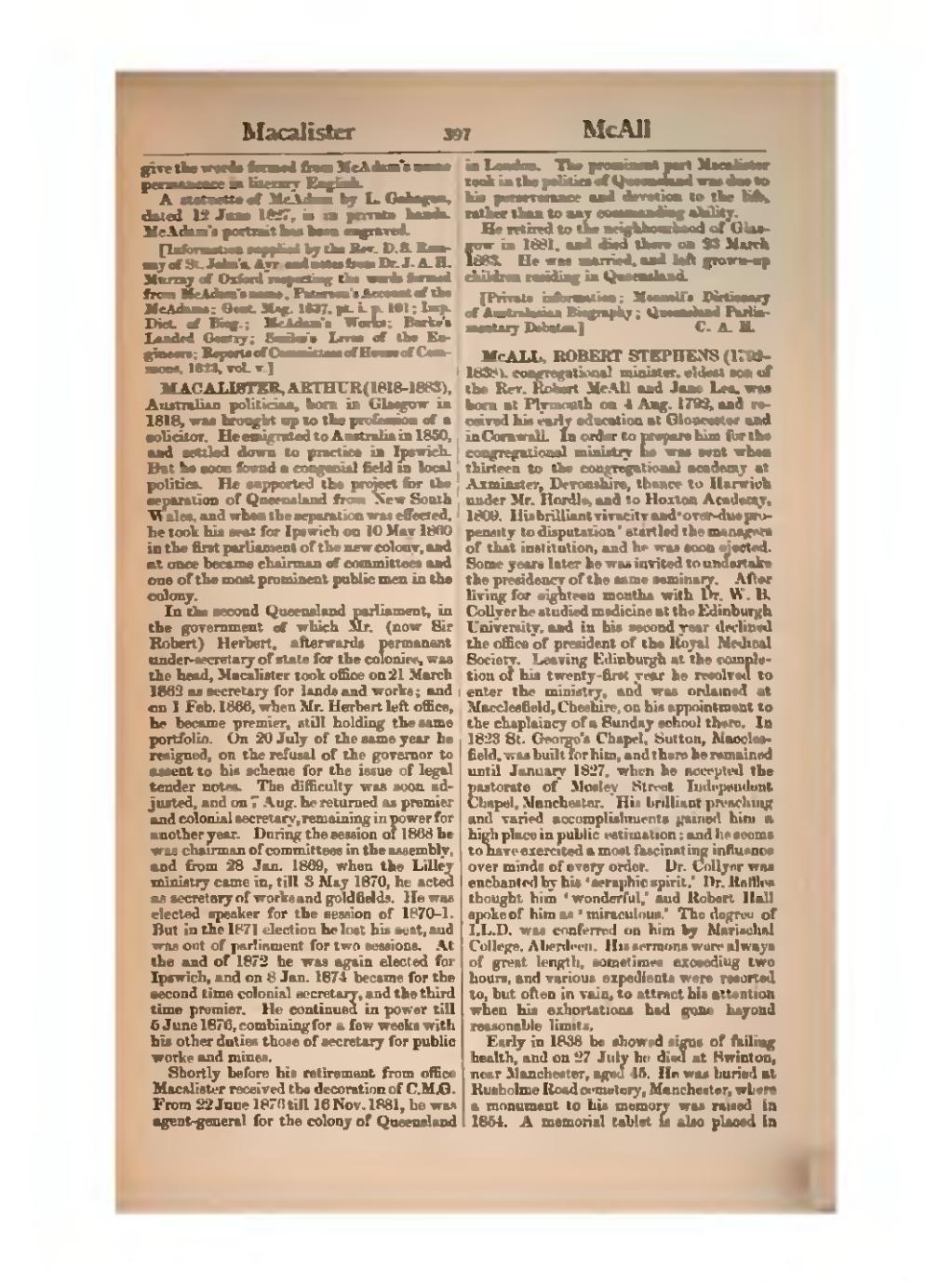give the words formed from McAdam's name permanence in literary English.
A statuette of McAdam by L. Gahagan, dated 12 June 1827, is in private hands. McAdam's portrait has been engraved.
[Information supplied by the Rev. D. S. Ramsay of St. John's, Ayr, and notes from Dr. J. A. H. Murray of Oxford respecting the words formed from McAdam's name; Paterson's Account of the McAdams; Gent. Mag. 1837, pt. i. p. 101; Imp. Dict. of Biog.; McAdam's Works; Burke's Landed Gentry; Smiles's Lives of the Engineers; Reports of Committees of House of Commons, 1823, vol. v.]
MACALISTER, ARTHUR (1818–1883), Australian politician, born in Glasgow in 1818, was brought up to the profession of a solicitor. He emigrated to Australia in 1850, and settled down to practice in Ipswich. But he soon found a congenial field in local politics. He supported the project for the separation of Queensland from New South Wales, and when the separation was effected, he took his seat for Ipswich on 10 May 1860 in the first parliament of the new colony, and at once became chairman of committees and one of the most prominent public men in the colony.
In the second Queensland parliament, in the government of which Mr. (now Sir Robert) Herbert, afterwards permanent under-secretary of state for the colonies, was the head, Macalister took office on 21 March 1862 as secretary for lands and works; and on 1 Feb. 1866, when Mr. Herbert left office, he became premier, still holding the same portfolio. On 20 July of the same year he resigned, on the refusal of the governor to assent to his scheme for the issue of legal tender notes. The difficulty was soon adjusted, and on 7 Aug. he returned as premier and colonial secretary, remaining in power for another year. During the session of 1868 he was chairman of committees in the assembly, and from 28 Jan. 1869, when the Lilley ministry came in, till 3 May 1870, he acted as secretary of works and goldfields. He was elected speaker for the session of 1870–1. But in the 1871 election he lost his seat, and was out of parliament for two sessions. At the end of 1872 he was again elected for Ipswich, and on 8 Jan. 1874 became for the second time colonial secretary, and the third time premier. He continued in power till 5 June 1876, combining for a few weeks with his other duties those of secretary for public works and mines.
Shortly before his retirement from office Macalister received the decoration of C.M.G. From 22 June 1876 till 16 Nov. 1881, he was agent-general for the colony of Queensland in London. The prominent part Macalister took in the politics of Queensland was due to his perseverance and devotion to the life, rather than to any commanding ability.
He retired to the neighbourhood of Glasgow in 1881, and died there on 23 March 1883. He was married, and left grown-up children residing in Queensland.
[Private information; Mennell's Dictionary of Australasian Biography; Queensland Parliamentary Debates.]
McALL, ROBERT STEPHENS (1792–1838), congregational minister, eldest son of the Rev. Robert McAll and Jane Lea, was born at Plymouth on 4 Aug. 1792, and received his early education at Gloucester and in Cornwall. In order to prepare him for the congregational ministry he was sent when thirteen to the congregational academy at Axminster, Devonshire, thence to Harwich under Mr. Hordle, and to Hoxton Academy, 1809. His brilliant vivacity and ‘over-due propensity to disputation’ startled the managers of that institution, and he was soon ejected. Some years later he was invited to undertake the presidency of the same seminary. After living for eighteen months with Dr. W. B. Collyer he studied medicine at the Edinburgh University, and in his second year declined the office of president of the Royal Medical Society. Leaving Edinburgh at the completion of his twenty-first year he resolved to enter the ministry, and was ordained at Macclesfield, Cheshire, on his appointment to the chaplaincy of a Sunday school there. In 1823 St. George's Chapel, Sutton, Macclesfield, was built for him, and there he remained until January 1827, when he accepted the pastorate of Mosley Street Independent Chapel, Manchester. His brilliant preaching and varied accomplishments gained him a high place in public estimation; and he seems to have exercised a most fascinating influence over minds of every order. Dr. Collyer was enchanted by his ‘seraphic spirit,’ Dr. Raffles thought him ‘wonderful,’ and Robert Hall spoke of him as ‘miraculous.’ The degree of LL.D. was conferred on him by Marischal College, Aberdeen. His sermons were always of great length, sometimes exceeding two hours, and various expedients were resorted to, but often in vain, to attract his attention when his exhortations had gone beyond reasonable limits.
Early in 1838 he showed signs of failing health, and on 27 July he died at Swinton, near Manchester, aged 45. He was buried at Rusholme Road cemetery, Manchester, where a monument to his memory was raised in 1854. A memorial tablet is also placed in
